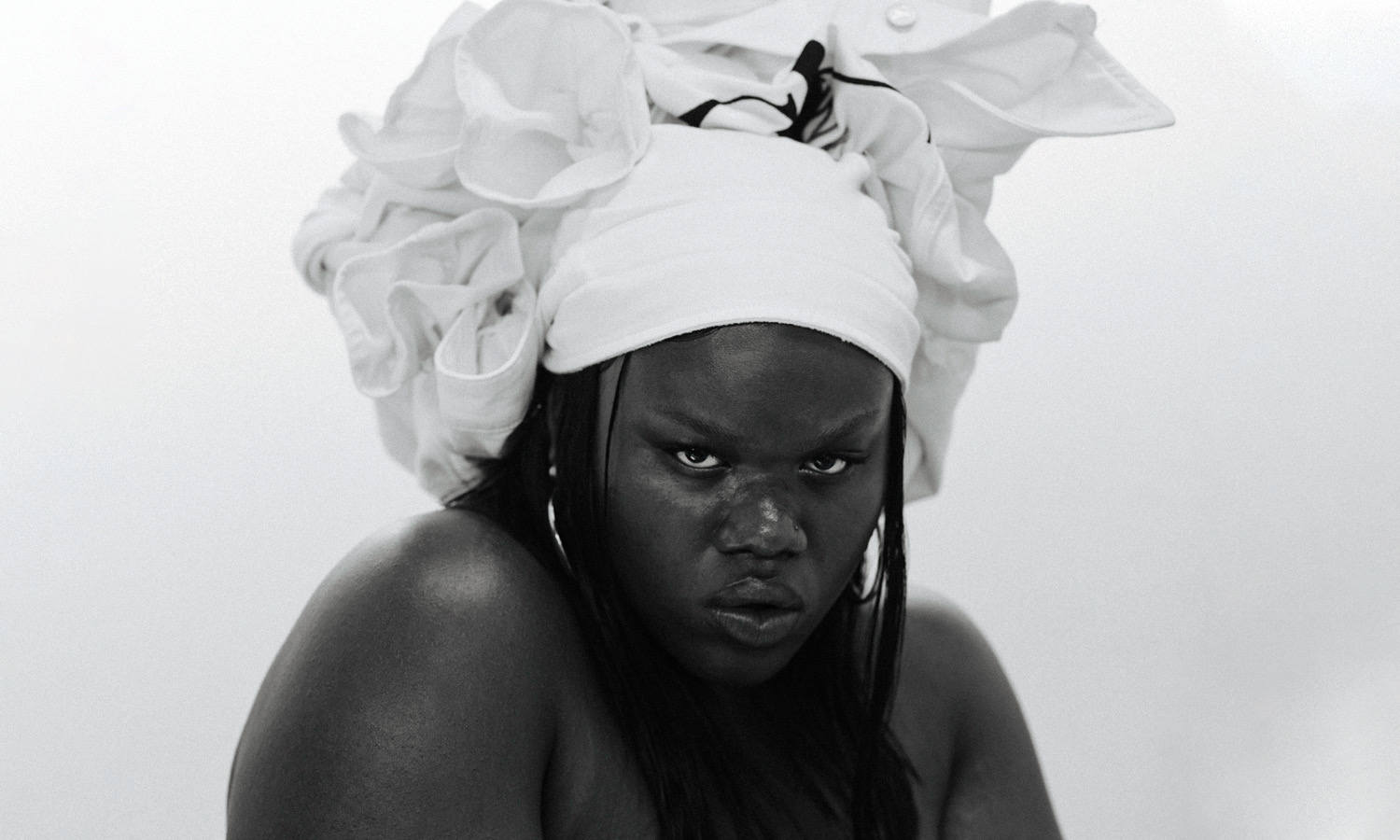Oprah Winfrey once said, “The biggest adventure you can ever take is to live the life of your dreams.”
Jari Jones, a Black trans woman and plus-size model, actor, producer, and activist, is proudly living the life of her dreams.
There was a time, not so very long ago, when thin, white, cisgender models utterly dominated the fashion industry. They were everywhere: in magazines, on television, in films, and on billboards. They were selling clothing, makeup, fragrances, and experiences, using as bait the allure of their effortlessly size-00 lives and their unending access to the most upper echelons of society. For decades, designers, brands, and storied fashion houses clamored to put their clothing on these sylphlike women, touting their bodies — and their bodies alone — as the ideal vehicles for fashionable, artistic expression. This attitude, combined with the plague of a constant rat-race mentality, over time created a toxic culture, one where whiteness, wealth, and especially thinness, were valued to the point of worship. These key factors determined who did and did not get to be a consummate fashion It-Girl, and those who did not fit into this very slim mold need not apply.
But it’s 2020, and Jari Jones (pronounced Yah-ree) is opening doors in multiple guarded palaces, not least of which in fashion. Jones, among her many achievements, has written strident opinion pieces for the New York Times and Out magazine; has been featured on the acclaimed Netflix series “Tales of the City”; and was the first Black trans producer to be featured in the Cannes Film Festival with her 2019 movie, “Port Authority,” a dazzling film about Harlem’s ballroom scene. Jones has been a vibrant part of New York’s queer and fashion crowds for years, having walked the runway during NYFW for some of the most inspiring and hip brands, including famously body and femme-positive Chromat, and the LA-based No Sesso, which made history in 2018 when its founder, Pierre Davis, became the first Black trans woman to show her collection during the official NYFW.
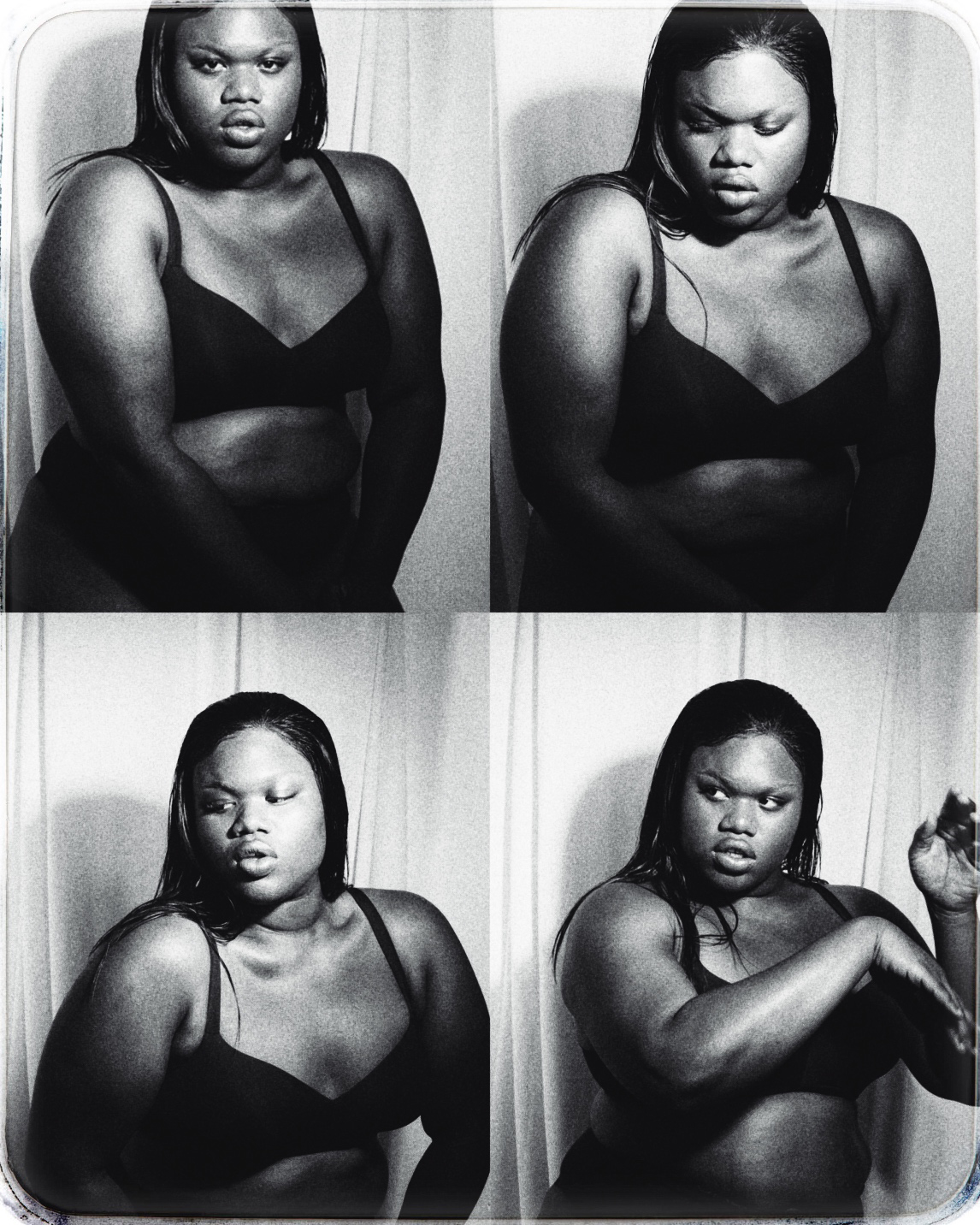
This past June, in honor of Pride month, Jones was featured as one of the newest faces of Calvin Klein for the brand’s annual Pride ad campaign. The traditionally black-and-white Calvin Klein shots, which were taken pre-COVID, show a diverse selection of CK-adorned LGBTQ+ models and artists, with this year’s iteration including singer Gia Woods, Brazil-based performer Pabllo Vittar, model Chella Man, and “13 Reasons Why” actor Tommy Dorfman. After publishing through mostly digital channels following the fallout of the mandated quarantine in New York City, Jones was chosen to be the newest solo model on Calvin Klein’s multi-story billboard in the heart of Soho. This billboard is considered one of the chicest and desirable billboards in America, as Soho’s usual throng of eager fashion die-hards and excitable tourists gives the billboard’s prime placement top-tier curbside appeal. The photo of Jones that was used is actually a crop of the full photo, but is still elegantly simple and straightforward, with Jones in front of a sky blue background, looking directly toward the camera, in an athletic, black CK top, her braids held up by a rainbow-striped bow, with a red lip, pop-punk purple eyeshadow, and sizable silver hoops.
But it wasn’t until Jones, who had gone into Soho with (less than 10 of her) friends to take celebratory photos, posted a picture of herself laughing while popping open a bottle of champagne in front of the Calvin Klein billboard, that the image went viral. That post alone has well over 230 thousand likes on Jones’ Instagram account.
“I was thinking about why that post went viral,” Jones tells V in our sit-down. “Was it more viral because, like, here’s a Black, plus-size trans girl celebrating her first debut on a major billboard? Or were people so shocked by the idea that a trans person or a plus-sized person would be put on such a high caliber billboard? And that she could be so proud of that? I’m still not sure.”
Whatever the reason, her post’s virality caught the attention of major news outlets like CNN and E! News, who shared the Calvin Klein-branded image all over the country, spreading Jones’ popularity manifold. She quickly gained tens of thousands of new social media followers and garnered the attention of other brands looking to utilize her beauty, her confidence, and her strong personal convictions in their own campaigns.
And now, Jones is gearing up to take on the world — both for herself and for those who will come after her. In Jari Jones’ self-described first high fashion editorial photoshoot, V and the Calvin Klein team came together to create a series of images meant to provoke change. The photographs, caught by Elite-represented Gabriel Perez Silva, show Jones in a new light. They represent growth, for the muse, for the fashion house, and for the industry itself. The images present a fervent and more fully-realized directive from a new generation of creatives, one that directs toward inclusivity, diversity, and optimism.
Here, Jones shares with V her life and experiences; how Calvin Klein has inspired her for years; and what she hopes is next, both for herself and for the communities she represents and fights for.
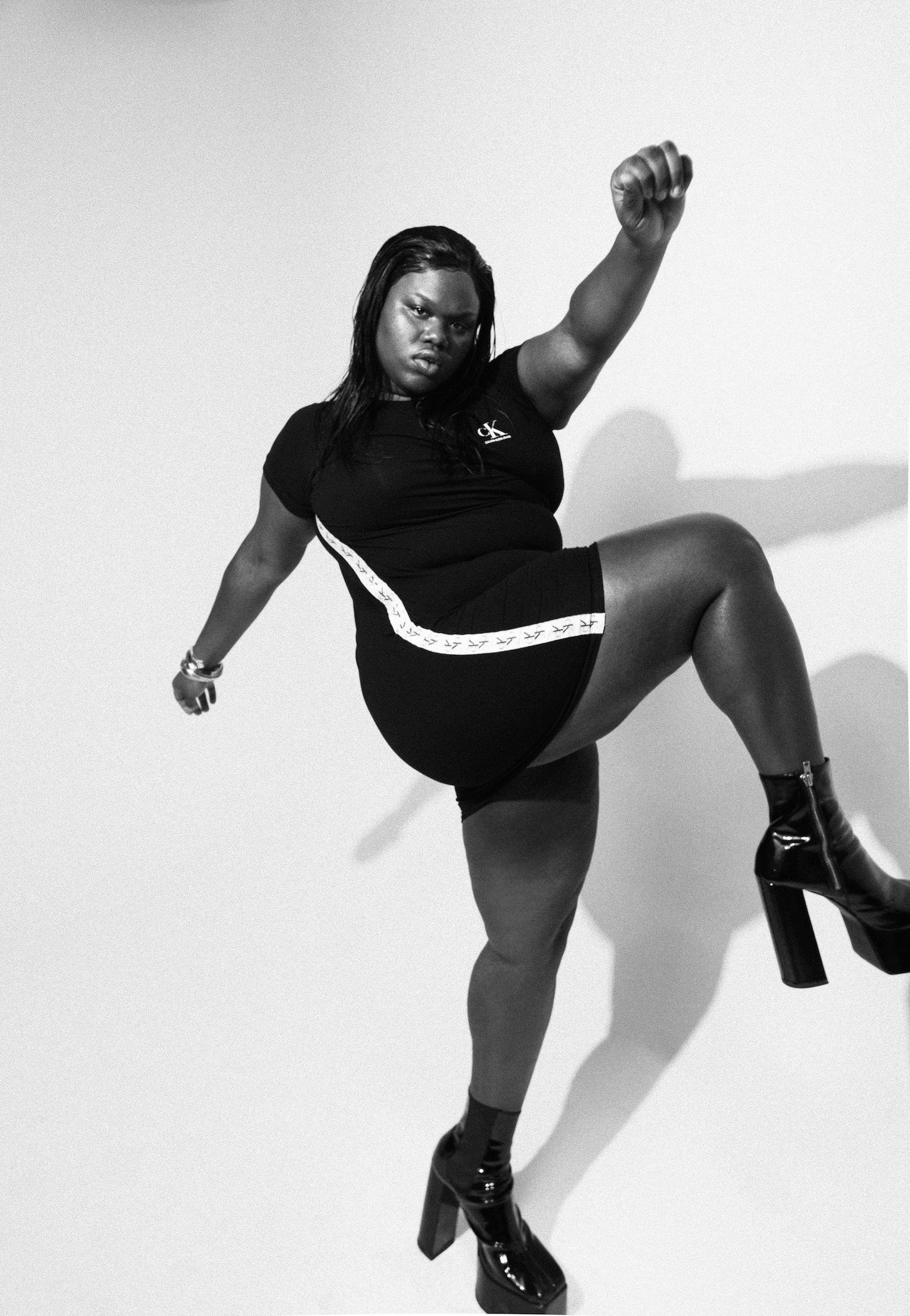
V Magazine How did Calvin Klein get in touch with you in the first place?
Jari Jones The Calvin Klein team reached out to me originally via emails, and told me they’d been watching me for a minute, that they loved my story and what I represented, and that they’d love for me to be a part of the CK family and join their Pride campaign.
V How did you react to that?
JJ I tried to play it off, be cool. Like, ‘yeah I’m busy that day but I’ll try to make it work,’ but on the inside I was fully freaking out. I got the email while I was on a train, so I’m reading this email sitting down, sobbing. I started calling my Mom. I’m like, mom I’m gonna be in a Calvin Klein campaign! Dreams are coming true!
We shot the campaign with my friend Ryan [McGinley] who I’ve worked with before, so I felt comfortable. Everything goes great, and my photos come out great, and they start to roll out the campaign. They were supposed to be putting campaign posters all over the city, but then COVID happened. So they switched to mostly digital ads, the campaign drops, and everybody’s excited. So then, another person at Calvin Klein was like, “did you happen to see our billboard in Soho? We put up an image from the Pride campaign featuring Tommy Dorfman.” And I’m like, that’s cool, Tommy looks phenomenal, but why are you telling me this? And then they go, you should see who’s going to go up there next. And then they ghosted me! [Laughs]
V So when did you actually become aware that you were the new CK girl up on the Soho billboard?
JJ My friend happened to pass by it on June 19, aka Juneteenth, which is also very special to me. She sent me a video of her passing by it, fully screaming in glee. So I had to go see it that day. I went downtown with a bunch of friends, and I got to see it. It felt unreal. We popped some bottles in front of it to celebrate and took some pictures. I posted them, and that’s when everything went viral. The image of me popping the bottle of champagne in front of the billboard seems to have made a bigger impact than the actual CK image itself. I was thinking about, why that post went viral. Was it more viral because, like, here’s a Black, plus-size trans girl celebrating her first debut on a major billboard? Or were people so shocked by the idea that a trans person or a plus sized person would be put on such a high caliber billboard? And that she could be so proud of that? I’m still not sure.
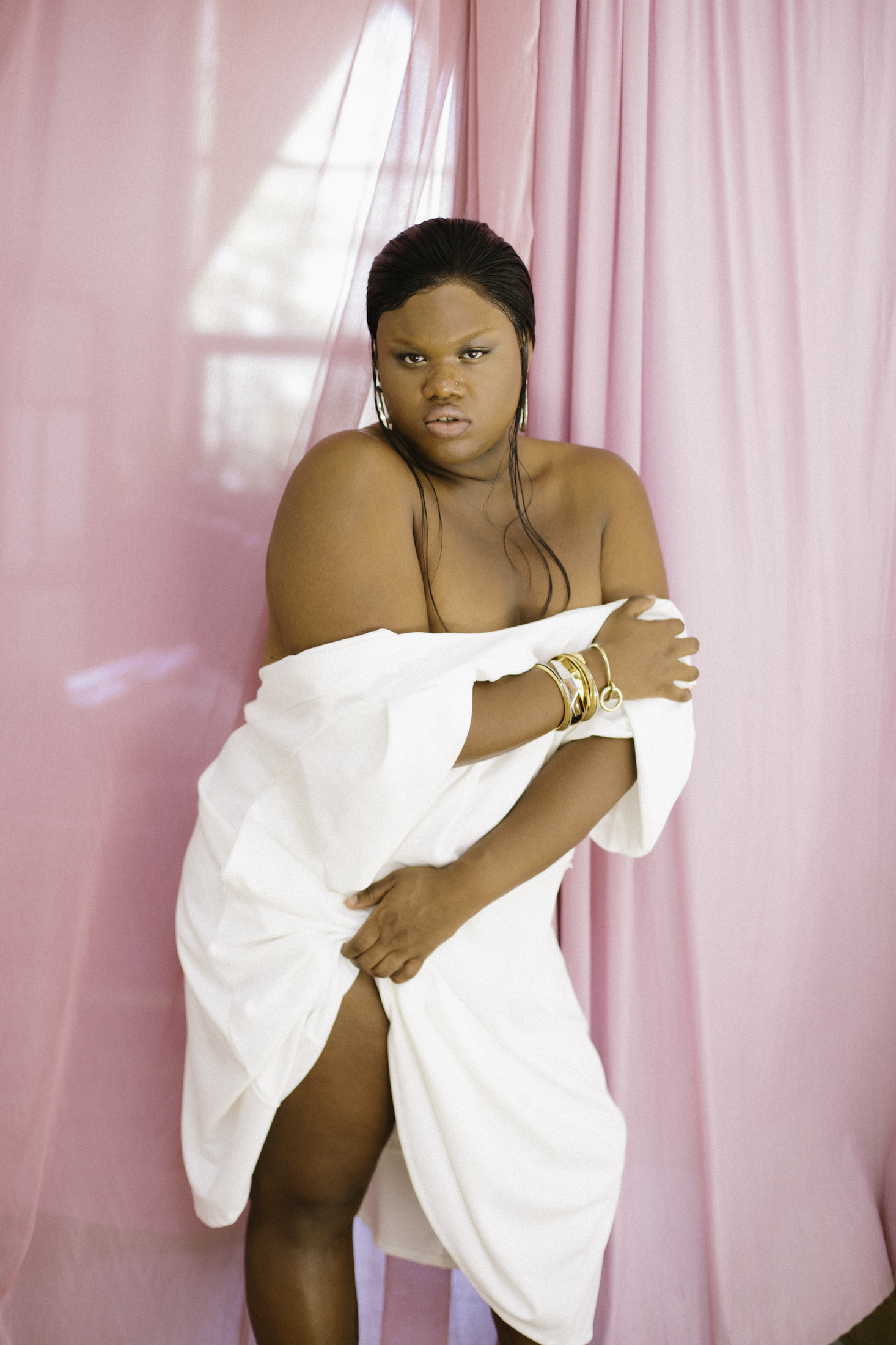
V I also wanted to talk to you a little bit about your history with Calvin Klein more generally. Every American has a story with Calvin, I feel.
JJ I have a couple of journeys with Calvin Klein, because Calvin has always been iconic to me. As you know, my grandfather was a model back in the ‘70s and ‘80s, and I’m pretty sure he’s done some stuff with Calvin. So it’s always been there, in my psyche, in my blood, the hope and dream of being a CK model. But it’s always been a far away dream. You see Naomi Campbell up there or Mark Wahlberg, these iconic people. And I always said to myself, I’ve got to become a famous actress first, and then somehow later, I’ll be a Calvin Klein model. “Jari Jones after her 20th Grammy nomination will be the new face of Calvin Klein!” kind of thing. But actually, that’s not how life works. Sometimes, things just happen at certain times for a reason. And for me to be on that billboard, during this time? It’s pretty beyond.
V When you were growing up, did you think that it was really possible to be living the life you are now?
JJ Not at all. There was no representation of plus size or trans people in the modeling world, really. Those things were seen as taboo or even fantastical, almost like looking at a rare animal in a zoo. I went to school for photography, and I thought that was my route into fashion. But modeling started naturally for me, and I realized I loved doing it. Yet even as I began getting more interest from the industry, I didn’t think that it would be possible for anybody like me to really make it in the way that I am now.
V Although Calvin Klein is certainly one of the more consistently woke companies — it has been heralding LGBTQ content for some years — they haven’t always been as inclusive, whether in terms of body representation, gender expression, etc. But, clearly, things have changed for the better! How do you think growth in terms of diversity is achieved for big, historic brands like Calvin Klein?
JJ I think it’s really being aware of the times. I think we’re moving in a direction where fashion is going to have to be inclusive. More and more, we’re finding that these marginalized identities are some of the most obvious and enthusiastic consumers of brands. So if you want to stay afloat, you pretty much have to listen to us. There’s no way that your company will survive without us. We’ve seen it time and again, companies speaking out about how they’re looking for a narrow subset of models and customers. And then look at what happens? You’ve lost one of the biggest broadcast lingerie shows in television history.
I think the difference between inclusivity as a trend as opposed to a foundational part of your company, depends on how much you’re doing, the quantity and the quality of it. Are you investing in us? Some companies will just throw one plus sized model and one trans model in there. That’s part of the problem. But Calvin Klein is putting a multitude of diverse and marginalized bodies on the forefront, and using something as big as the Soho billboard to promote us, celebrate us?… It’s a big deal. Listen, I am all for companies growing and having some kind of restorative justice for what they’ve done in the past. If in the past you only ever cast skinny white models who are cis, it’s past time to change that. Right now, I think CK is moving in a progressive way, and it has shown consistency, so that is something that we can celebrate and grab on to.
We have to hold companies accountable, but I think they have the ability to grow and make amends.
V You don’t need to be canceled automatically.
JJ Absolutely. I think cancel culture comes in when we’ve told you what you’re doing wrong, and you’re still on your bullshit. But I like watching companies grow and get better. Brands like Calvin Klein are more and more hiring people of color, marginalized folks, artists. I think fashion is still art. [It] would be a loss to cancel historic brands. Instead, let’s demand that they become more expansive, more inclusive. I would rather see growth than get rid of it entirely!
V What does it feel like to not only be breaking glass ceilings in the fashion world, but also being a face of the post-COVID world?
JJ [laughs] That’s true. I have never thought about it like that. I’m experiencing this weird duality where there are catastrophic things happening out in the world and on these streets. Police are still killing Black and brown people. COVID is still killing marginalized people at high rates. And yet my face was on the most iconic billboard in New York City. So I’m trying to find ways to connect with my community, while also celebrating myself during these dark times. I’ve been receiving images of Black Lives Matter protests marching in front of the billboard, going past my billboard. And I think about how I could represent the future. You know those old movies from back in the day that were like, ‘what does the year 2020 look like?’ Maybe that’s me. We have people who are fighting for our future, and I feel like that is something I want to represent. I want a world where Jari Jones is not the only plus-size Black trans model on a billboard.
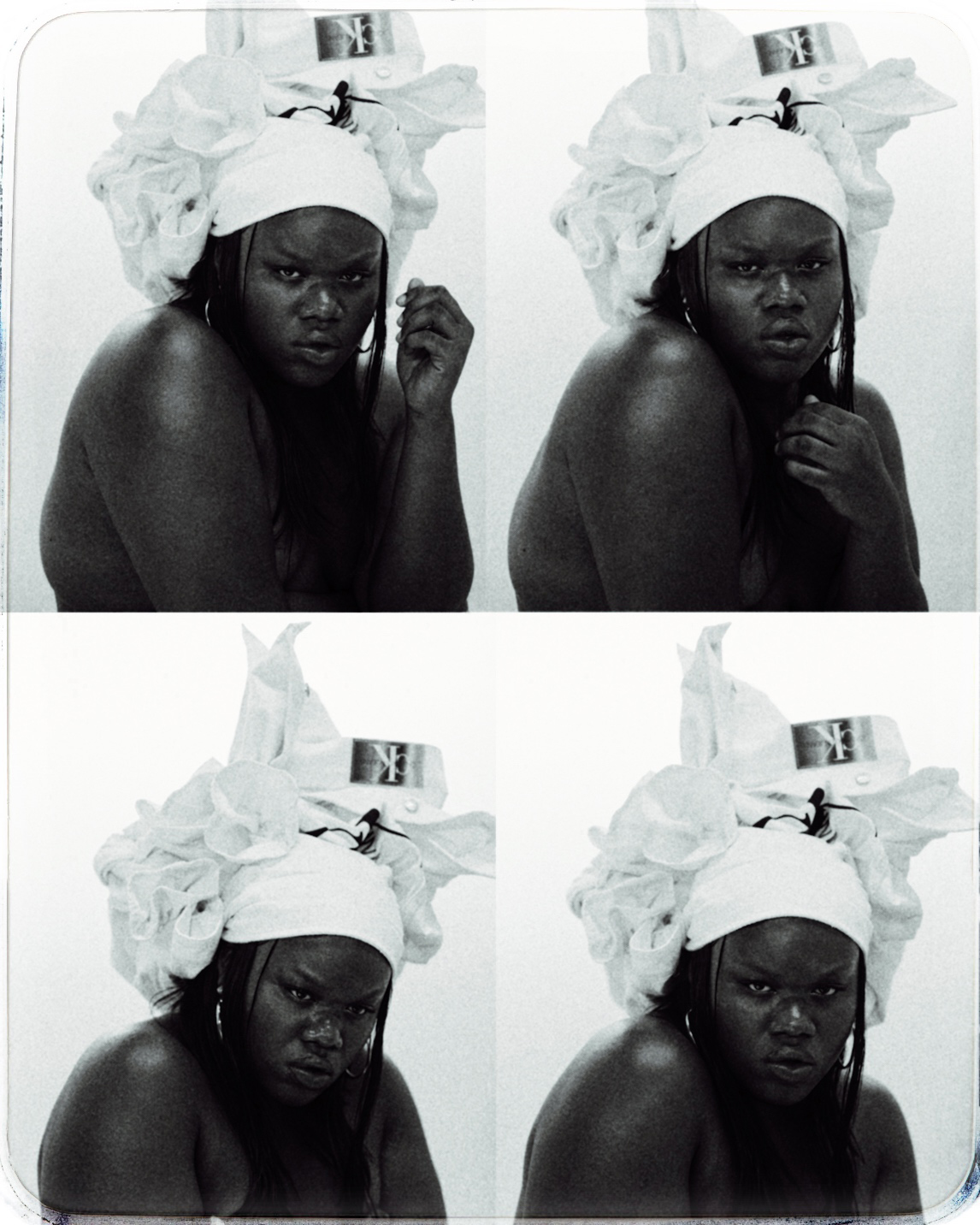
V Do you think that the work you’re doing right now — modeling for the mass market, widely seen, big-name brands — is helping to bring cohesiveness to the various social movements in America right now?
JJ Most definitely. I think, for one, that there is combativeness between marginalized communities, and that is why my representation matters so much. As a queer person, I cannot take away my Blackness. As a Black person, I cannot take away my queerness. So it has to coexist. And there’s no way that I can’t fight for growth. It is about my survival, across the board.
V So let’s talk a little bit about the photoshoot. So did you enjoy yourself? Did you have a good time?
JJ It was beyond! When I started my career, I was the smiley, bubbly girl, doing commercial, commercial, commercial, commercial. But I also saw the editorial world and always wondered why they discriminated against plus-size people so much. We often only see fat people as jolly, jokey, and happy. Whereas editorial is serious and rigid, high contrast, slicker. And I was like, you know, I can give that to you, too. I’m a human being who is capable of many emotions, capable of many different faces, capable of as much fierceness as any other high fashion model. So this V photoshoot has been very important to me. I’ve never shot editorial before, this was my first time! My first time being taken seriously enough to shoot an editorial. I think a lot of people don’t take trans folk seriously. And a lot of people don’t take plus-size people seriously. So something of the caliber of V… I mean, this is how some models become really famous. I want people to be stricken into attention from this high fashion moment so that they can read the content that’s coming with it. It’s why I choose to show my body, why I choose to express my transness in different ways. I want people to read the story after the photographs. Nobody is going to read my story that follows after a Target campaign. Yes, the money may be good, but if I’m in V, there’s my story behind it. I love the crossover of editorial and commercial! Why shouldn’t I be able to do both?
V You are doing it. You did it. Continuing to do it! Do you foresee more models like you getting more work?
JJ I absolutely hope so. I really do. I don’t want to be the enigma, for it all to have been for nothing. In some ways I don’t consider myself a model, I say I’m a possibility model! I want companies to see my Calvin Klein billboard or the campaign or this shoot and be like, we want that as well. There are a million plus size models out there. There are millions of trans models that are out there and people just don’t know about them because they’re not looking for it. Nobody knows that they exist. And that’s why I continue with my social media work, to uplift trans people, trans people of color, people with different bodies and ways of living. Because I know that these big companies are now looking at my page, and it’s important.
V How do you deal with negative backlash over social media and the internet in general?
JJ Well, it has not affected me to the point where I want to stop. But it has made me aware of the magnitude of how many people I’m actually reaching.
V Not just fans.
JJ Yep, and everybody has an opinion. I have people who say, wow, you are one of the most inspirational people I’ve ever come across in my life. And then I have people who say, if I ever see you in New York, I will kill you in the street. I’ve taken precautions, I’m not a stupid girl. I don’t post live now if I’m in public. I’ll post at home an hour or two after I’ve left the place.
But just as much as the negative comments overwhelm me, positive ones can, too. Because everybody wants to pour their heart out to you. And they expect that back, which is just how culture works, especially with queer folk and people of color. People see a Black woman like me on their feeds and they’re like, that’s a mother figure. How can she pour into me? I try to do the best I can. I love to give. That’s my thing. But I’ve only got so much, and I have found myself, especially over the last couple of months, running on E. So I have to recharge. I have to turn it off sometimes.
V Do you read them, the negative comments?
JJ I’ve read some of them. Some of them are so ridiculous they make me laugh.
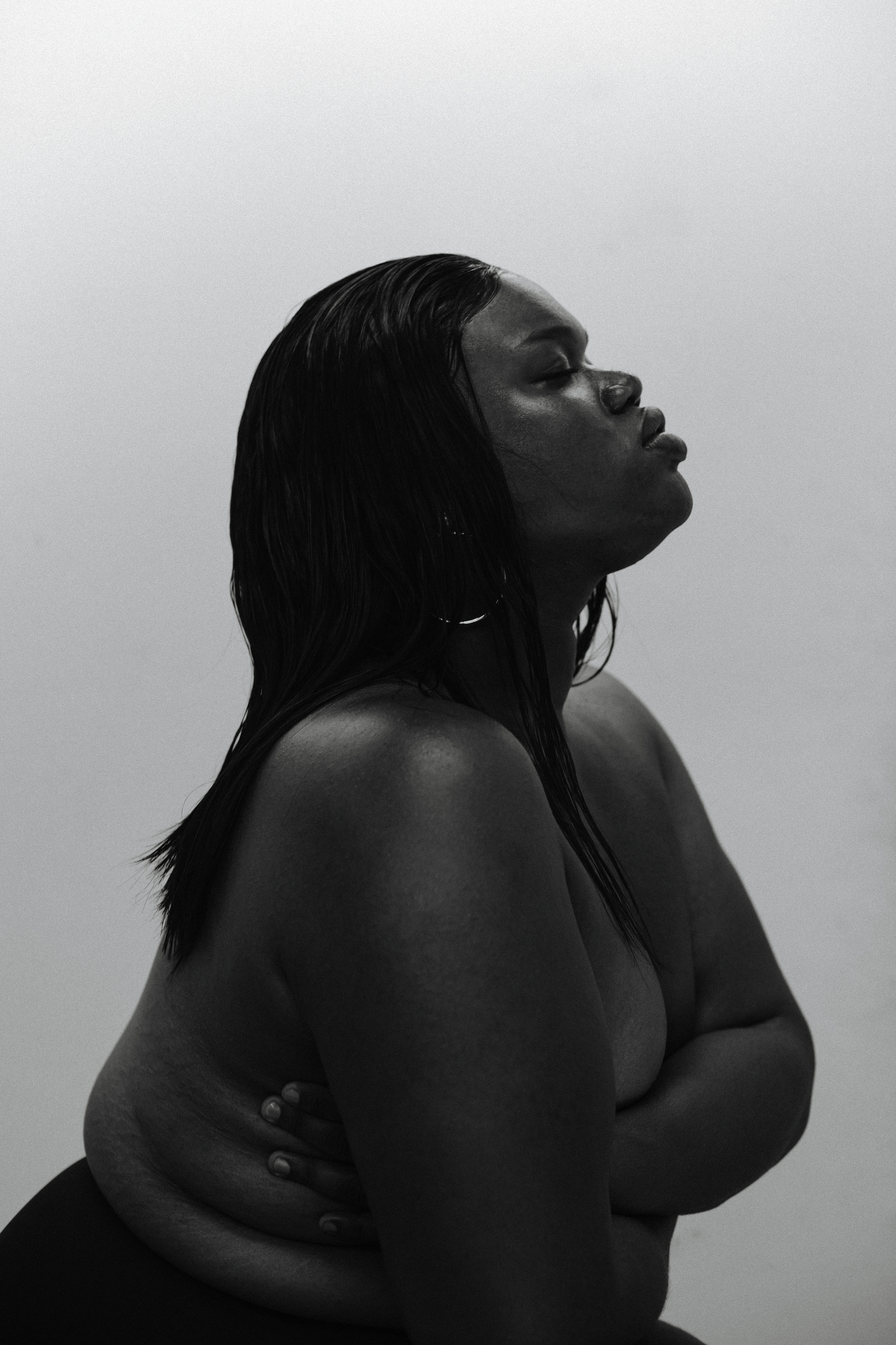
V You posted a bunch of those negative comments after the Calvin Klein billboard photo went viral. Why?
JJ I feel like the universe has always been preparing me for what my life is now. I’ve had to practice a lot of patience and exercise resilience and self-love as a Black trans woman. People say the vilest things behind their keyboards. I think posting those negative comments was a way to show reality. Because here is somebody who’s on a Calvin Klein billboard, who is hitting all these magazines and ads, people are celebrating her. But also, she’s getting a lot of negative feedback. It takes a lot of strength to get through these things. And it’s not just, an image goes up and then it all goes away for me. I’m doing interviews, I’m having to share intimate parts of my life. I think that’s been the biggest change that I’ve had to adapt to, where I’ve stopped posting as much because so much of my life is public now. Every move I make is being documented or recorded. So I really try to be mindful of how big this is. I don’t want it to scare me. I don’t want it to wear me down. I think the reason these companies are reaching out to me, or wanting to feature me, is because of my resilience. I am empowered by who I am. So I don’t want to lose that and become just a commercialized girl. I’m going to continue to post nude photos of myself. And people are going to live for it! [laughs]
V What are your plans?
JJ My plan is to ride this wave and make sure it becomes a sustainable, ever-flowing river of plenty. I want to expand… not for just me, but for everybody. I tell the plus size girls and the trans girls and the queer people who DM me, that this moment is for us. I want to jump-start everybody. My visibility gives them more visibility. I know there will come a time when I’m going to want to stop. When I will say, OK, this is not my life anymore. But I don’t want my career to be the end of an era, and I’m working to make sure it is not.
Discover More
